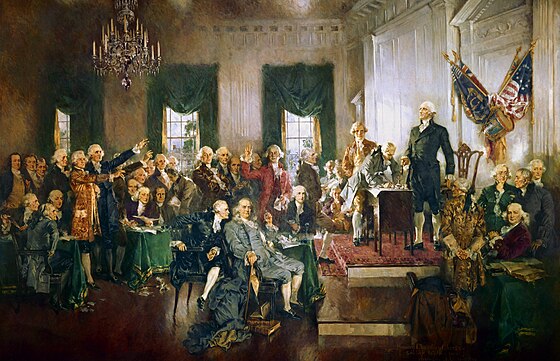----------------------------------------------------------------
"Either this nation shall kill racism, or racism shall kill this nation." (S. Jonas, August, 2018)
------------------------------------------------------------------------------
"To announce that there must be no criticism of the President . . . is not only unpatriotic and servile, but is morally treasonable to the American public. Nothing but the truth should be spoken about him or anyone else. But it is even more important to tell the truth, pleasant or unpleasant, about him than about anyone else." Theodore Roosevelt, Editorial in The Kansas City Star May 7, 1918. (And that's Kansas City, MO.)
----------------------------------------------------------------------------
The United States Constitution, for all of its defects in terms of the protection of the institution of slavery such as the Electoral College, established four totally unique features of government in comparison with all the forms of government that had preceded it. Three of them have direct application to the consideration of the brand-new "Dershowitz" and "McConnell" Rules (see below), now, under this Senate at least, part of the Highest Law of the Land.

Scene at the Signing of the Constitution of the United States. No Dershowitz' or McConnells there.
(Image by (Not Known) Wikipedia (commons.wikimedia.org), Author: Author Not Given) Details Source DMCA
First, the framers determined that there are three primary functions of any government: the legislative, the executive, and the judicial. Second, they decided that there should be a governmental branch for each function, and each should have certain powers independent from the other two. In no way should the executive branch be supreme, as it had been in all previous governmental models. (Of course, that model has continued to command governments in a variety of nations down to our present time, a certain "I can do whatever I want" President has said that he would like to find himself in their company.)
Third, they decided (with a major assist about 15 years after the Constitution was written by the third Chief Justice of the United States, John Marshall) that the interactions of the three branches would put them on a somewhat equal footing. (Under the Trump Administration, with a strong assist from the Trumpublicans © in the Senate, that delicate balance is beginning to break down; see further below.) The fourth unique feature, representative government, does not have direct application to the present case. (Of course, at the beginning that feature did provide for only a limited electoral mandate, which the Trumpublicans ©, with voter suppression and gerrymandering, are working hard to reinstate, but that is another matter.)
In Article II, Sect. 2 the United States Constitution provides for very limited powers for the President. It is short enough that I can reproduce it here without overwhelming the column:
"The President shall be Commander in Chief of the Army and Navy of the United States, and of the militia of the several States, when called into the actual service of the United States; he may require the opinion, in writing, of the principal officer in each of the executive departments, upon any subject relating to the duties of their respective offices, and he shall have pow er to grant reprieves and pardons for offenses against the United States, except in cases of impeachment.
"He shall have power, by and with the advice and consent of the Senate, to make treaties, provided two thirds of the Senators present concur; and he shall nominate, and by and with the advice and consent of the Senate, shall appoint Ambassadors, other public Ministers and Consuls, Judges of the Supreme Court, and all other Officers of the United States, whose appointments are not herein otherwise provided for, and which shall be established by law: but the Congress may by law vest the appointment of such inferior Officers, as they think proper, in the President alone, in the Courts of law, or in the heads of departments.
"The President shall have power to fill up all vacancies that may happen during the recess of the Senate, by granting commissions which shall expire at the end of their next session."
Of course, over the centuries since the adoption of the Constitution many powers other than the ones enumerated above have been granted to the President, by the Congress. Over time I have read the above section as it stands numerous times. Nowhere in it, nor in any of the laws of Congress broadening Presidential Power, that come to mind, such as the War Powers Act, have I found any power approaching "if he thinks some policy or other maneuver is good for the country, including some action to promote his re-election whether or not there are other aspects of it he can carry that out without limit."
This is the Dershowitz Rule. Subsequently he tried to "walk it back ," (funnily enough on the president's favorite medium for everything from announcing new national policy, to firing officials from his Administration, to engaging in his favorite political tactic, "Always attack; Never defend" against all and sundry opponents). But that is all unofficial. What is official, and he was speaking as a member of the President's defense team, is what he said that is in the Congressional Record.

Alan Dershowitz 2009 retouched cropped. OMG. The President LOVES me.
(Image by (From Wikimedia) Sage Ross, Author: Sage Ross) Details Source DMCA
Next, Article I, Section 8 of the Constitution spells out the powers of the Congress. It is so long that if I will not reproduce it here. I have also read this text, much longer than that of Article II, Section 2, many times. Nowhere in it have I found any power granted to the Congress that says that it may not consider a nomination to the Supreme Court in the year before the next Presidential election. Also, the Congresses' impeachment power is defined separately from Article I, Section 8, in Section 3, and is also touched upon in Article II. Again, nowhere in those parts have I found any power granted to the Congress, or limitation of Congress' power, that says that it may not consider impeachment of the President in the year before a Presidential election.
Nevertheless, through the actions and words of one the defense attorneys for the President, Alan Dershowitz (and in his performance he made it clear that while he is not a Constitutional scholar, he is an excellent defense attorney) this new expansion of the Power of the Presidency has been introduced into Constitutional Law. (And it will be there for at least for as long as the Trumpublican © Party has the Senate majority.) It is of course the "in the President's mind what is good for the country" rule. In essence this has established, for this President at least, the power of Dictatorship, without even requiring the passage of some version of the Enabling Act which on March 23, 1933 gave Adolf Hitler dictatorial power in Germany.
Then there is, as is well-known, the Majority Leader, going back to the Merrick Garland nomination, who made up the "no Supreme-Court-nominations-from-a-President-of-the-Opposite-Party-shall-be-considered-in-the-year-before-a-Presidential-election" rule (but of course that rule does not apply to such nominations from a President from his own party, as he has already told us).

Senator Mitch McConnell in 1992. By golly, he knew even back then what power he wold come to have.
(Image by (From Wikimedia) Laura Patterson, Author: Laura Patterson) Details Source DMCA
And then McConnell created another rule not in the Constitution, that is that if a President from the same Party as that of the Majority Leader is impeached under the rules of the House of Representative, under its Constitutional power to do so, any and all evidence of any kind, offered directly by persons or in writing, may be withheld by the impeached President if he/she thinks that doing so is in order. Further the Majority Leader would make sure that neither possibly relevant personal testimony nor documentation would make its way to the Senate Floor. And further still, the Majority Leader would act to coordinate Senate procedures with the White House's development of its defense. (Of course, left unsaid is that if a President of the opposite party were impeached by a House of the same party as that of the Senate Majority, the Leader's new rules would not apply. But that is another matter).
There are many things wrong with what has happened to Trump and the Power of the Presidency in these impeachment procedures. This dis-allowance of the presentation of evidence of Presidential criminality in the Senate is only one of them. And since it is so well dealt with in many other venues, I shall not deal with that one here. What I shall also not deal with here is what the combined actions of the White House and the Senate majority have done to the separation of powers, the power of the Congress to have oversight over the President, and the impeachment power itself.
What I shall deal with, very briefly, here is what does all of this mean for the future of the nation should Trump be re-elected, especially if Congress returns to full Trumpublican © control, as it likely would? I have dealt with this matter before in some detail and surely will again. But for now, under the Dershowitz Rule a Trump Dictatorship would be established, and under the McConnell Rule, should he still be the Senate Majority Leader, there is no way that in the future it could be challenged, in the Congress.
It would have all kinds of predictable outcomes, ranging from arrests of leaders of the opposite party, the likely establishment of concentration camps for certain ordinary citizen political opponents as "dangers to the state," the passage of a national libel law, with very low standards for what amounts to "libel," in the Congress enabling the shutting down of virtually all opposition media (an action hinted at by Trump ghost-writer Tony Schwartz in an appearance on MSNBC, Jan. 31, 2020), the end of any separation of church and state (that is if the church is that of the Evangelical Republican Right ERR), the creation of a U.S. Sturmabteilung, S.A., which was the Nazi Party's private army until Hitler disbanded it in July, 1934 as the price for the unconditional support of the German Army (see the pro-gun, pro-Trump 'militia' demonstration, with threats of armed action, at Richmond, VA against gun-limitation legislation, on January 4, 2020), and so on and so forth, as spelled out in some more detail in an earlier column .

Bundesarchiv B 145 Bild-P049500%2C Berlin%2C Aufmarsch der SA in Spandau. Just wait.
(Image by (Not Known) Wikipedia (commons.wikimedia.org), Author: Author Not Given) Details Source DMCA
Let me finish this column with the following note. A top leader of the Green Party, an old friend of mine, from years ago when we both were working in the attempt to end the "Drug War," having seen the points made in the previous paragraph, in the conext simply of my presenting them as factors for that party to consider as it puts together its strategy for the 2020 election, has twice labelled me as a "fear monger." To that charge let me plead guilty. There is plenty to fear in a Trump re-election and I will be mongering that fear from now to election day.
---------------------------------------------------------------------------
Postscript: Trumpite proto-fascism in action, now: "The Treasury Department sent information on Hunter Biden to expanding GOP Senate inquiry" (click here). This of course is just the kind of information on Trump/Giuliani/Ukraine that Treasury refused to supply to the Dems. for the impeachment inquiry.
(Article changed on February 6, 2020 at 20:02)




